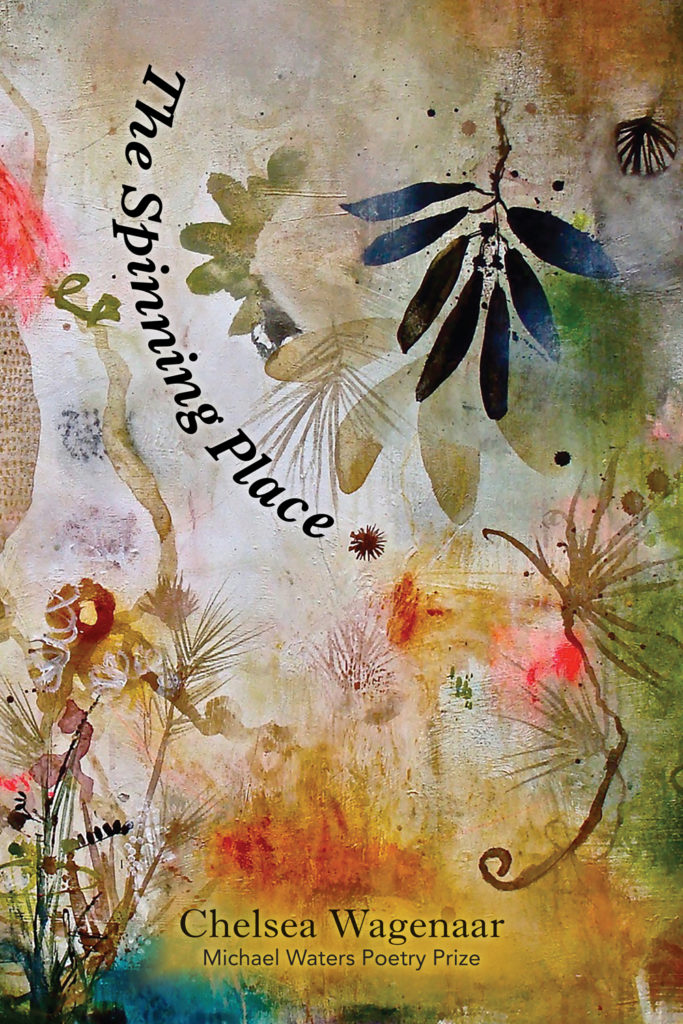Tracing the Infinitesimal and the Infinite: A Review of ‘The Spinning Place’ by Chelsea Wagenaar
By Allison Wall
Posted on

Chelsea Wagenaar’s poetry collection The Spinning Place is an intensely personal exploration of relationship, family, and motherhood. Her voice is that of a mystic, reporting to us the connections everywhere between the mundane and the sublime, the infinitesimal and the infinite. She fearlessly relates the sacred mysteries of life: the dreams of infants, the cold silence after an argument, the empty space where a barn once stood, and the miraculous odds of having been born at all.
Wagenaar’s sparkling train of thought stitches together these otherwise disparate elements, these connections we miss in the rhythm of our daily lives. In “The Spinning Place,” the first of three poems with the same title and the poem that opens the collection, Wagenaar leads us through a graceful flow of subjects, leaping from the creative writing classroom to the delivery room to the Mars Rover, singing “Happy Birthday” to itself alone on that red, alien planet. In “Descent (Sort of an Annunciation),” at a sonogram appointment, the poet becomes a hawk watching for prey by the highway, and her prey—the hawk’s mouse in the grass—becomes the fluttering heartbeat on the screen.
Wagenaar writes much about pregnancy and the birth of her daughter, and she spends many lines ruminating on the relationship between her and her child. In one of the most powerful poems in the collection, “Delivery Room (Sacrament Under Erasure),” she speaks to her daughter in some of the most important words of the Christian tradition as she’s being born: “offered it to / you, my blood / poured out for / you.” Jesus used these words to reference his coming death, which, according to Christianity, was self-sacrificial, and provided life for others. Wagenaar weaves them in, but with uneven alignment and large gaps between words. The immense work of childbirth, the struggle to usher in a new life, and the universal position of mother as divine sacrificial life-giver is powerfully insinuated.
But through Wagenaar’s eyes, there is nothing less significant about the particular, the small details, the shadows of tree trunks at twilight, or the pattern of a poison ivy rash. The particular blossoms into the universal. Everything is connected, and everything means something, and the most important thing is—everything. From line to line, Wagenaar ushers us deeper into the fractal of existence, and then in a breath, zooms out again to a cosmic perspective. Wagenaar’s net of connections—from Earth to Mars to eggs waiting to be fertilized and born—catches us all safely.
In all these connections, though, there are separations between a husband and wife, between the earth and the sun, between sleeping and waking. In the second poem titled “The Spinning Place,” Thomas Stevens, the first person to ride a bicycle around the world, spends a day with a Hungarian woman, but when night falls, she leaves, and “…the distance between them unspooled / and irrevocable, held in place by the flash / of spinning spokes, that bright and restless carousel.” The distances in The Spinning Place ache to be filled, to be overcome.
Some things cannot be spoken. We have no “word for longing / for someone who is in the same room.” Pain itself is invisible. Some things don’t need to be spoken in words. Of her daughter, Wagenaar writes, “She knows / her voice will turn / my face to her.” And some things her child baptizes with unexpected words. The streetlamp becomes “moon,” the squirrel becomes “dog,” and entirely new connections emerge in her beautiful perspective.
Wagenaar’s prowess is clear in this wide-ranging and emotional collection. Every word rings true, like a bell at dawn. Her brave vulnerability and undaunted curiosity unveil a world that is familiar, but deeper, stranger, and far more beautiful than we may have noticed before. There is no real substitute for reading The Spinning Place. To all who seek to break through the mundane to the divine in every moment and thing, I heartily recommend this book.
– Allison Wall